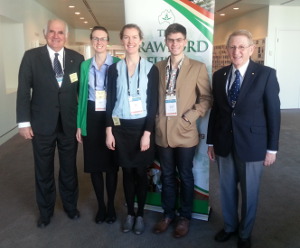

2014 Young Scholars: James Manson

James Manson
Student, La Trobe University
Sponsored by the Victorian Committee
James is from Melbourne, although he has lived most of his life in Chiang Mai in northern Thailand. After finishing high school there, he did a two year voluntary internship in agricultural development with an NGO called ECHO Asia. This experience created a deep passion in James to serve the poor through agriculture. In his studies in agriculture and international development at La Trobe University, he seeks to understand the many factors that affect food security. He is preparing himself to work with hill tribe farmers in Southeast Asia in the future.
Conference report
…Perhaps the longest lasting benefit of this conference will be the introduction I was given to the career paths available in international agricultural research…
Attending the Crawford Fund 2014 Annual Parliamentary Conference was a highlight of my year thus far. It benefitted me in several key ways, including becoming familiarised with current Australian agricultural development thought, learning about opportunities for further study and career paths and having the opportunity to discuss agricultural development with people currently putting it into practice.
After completing a two‐year internship with an agricultural development NGO in Thailand in 2010‐2012 I was somewhat familiar with development principles and thought, which my studies at university have added to. However I have not been able to keep up to date with the current trends and issues that are facing development workers today, especially coming from the Australian context. The conference was highly informative in this regard. Nutrition security was a new concept for me but one that makes a lot of sense. Before I found the double degree I am currently studying I had hoped to find a double degree in agriculture and human nutrition, and while that was not possible this conference has renewed my interest and improved my understanding in this aspect of agricultural development. It was also informative to hear about the widespread recognition of the issue of gender in agriculture and to learn some practical suggestions on how to accommodate for it in development planning. The role of education in agriculture also stood out to me, with one of the speakers pointing out that there is a correlation between higher education and higher farm incomes. Although it is somewhat self‐evident it highlighted for me the multifaceted nature of development work and the need to be flexible in order to use multiple approaches to improving conditions for smallholder farmers across the world.
Perhaps the longest lasting benefit of this conference will be the introduction I was given to the career paths available in international agricultural research. Before this conference I was a little at a loss for how to begin to pursue a career in agricultural development but I am now aware of several opportunities. In fact I am able to breathe a sigh of relief that there are many opportunities! During the networking dinner I spoke to several professors and PhD students who provided several examples of pathways and their experiences. I learned of the ACIAR graduate program and the funding it provides for postgraduate students to do international agricultural research. I have gained several leads to follow up with in future years as I continue along my career path. I cannot thank the Crawford Fund enough for this assistance.
The highlight of the conference for me is quite general and covers several experiences. I loved talking about agricultural development again! What I mean by this is that in my degree I go from studying the science of agriculture to the social sciences relating to international development – there are no agricultural development classes so it is up to me to make the connections between the two. It was wonderful to listen to lectures, speak with professionals and trade ideas at the nexus of agriculture and development again.
As this report has shown the conference has assisted me greatly in moving towards a career in
agricultural development. Thank you!